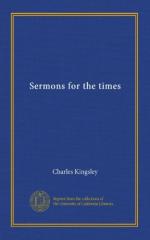Now their duty is the same as ours; and therefore the prayer which is right and good for us is equally right and good for them. And what is more, we cannot pray rightly for ourselves unless we pray for them in the very same breath; for the Catechism tells us that there is one duty for all of us, to love and obey and serve our heavenly Father, and to love our neighbour as ourselves, because they are our brothers, children of one common Father, members of the same God’s family as we are, and their interest and ours are bound up together. Yes, to love all mankind as ourselves; for though too many of them, alas! are not yet in God’s family, and strangers to His covenant, yet God’s will is that they too should come to the knowledge of the truth; and therefore for them we can pray hopefully and trustfully, ’Lord have mercy on all men, on Jews, Turks, Infidels, and heretics; and bring them home, blessed Lord, to Thy flock, that they may be saved and made one fold under one Shepherd, through Jesus Christ our Lord, in whom Thou hast declared Thy good will to all the children of men.’
This is the right prayer. That all men may do their duty where God has put them. That those who, like the heathen, do not know their duty, may be taught it; that we who do know it, may have strength to do it.
And therefore it is that the Catechism teaches us the need of prayer, immediately after making us confess our duty; and therefore it is that it begins by teaching the Lord’s Prayer, because that prayer is the one, of all prayers which ever have been offered upon earth, which perfectly expresses the duty of man, and man’s relation to Almighty God.
It is throughout a prayer for strength. It confesses throughout what we want strength for, to what use we are to put God’s grace if He bestows it on us. Our delight in the Lord’s Prayer will depend on what we consider our duty here on earth to be.
If we look upon this earth principally as a place where we are to pray for all the good things which we can get, our first prayer will be, of course, ‘Give us this day our daily bread.’
If we look at this earth principally as a place where we have a chance of being saved from punishment and torment after we die, then our first prayer will be, ‘Forgive us our sins.’ And, in fact, that is all that too many of our prayers now-a-days seem to consist of,— ’Oh, my Maker, give me. my daily bread. Oh, my Judge, forgive me my sins.’ Right prayers enough, but spoilt by being taken out of their place; spoilt by being prayed before all other prayers; spoilt, too, by being prayed for ourselves alone, and not for other people also.
But if we believe, as the Bible and the Catechism tell us, that we and all Christian people are God’s children, members of God’s family, set on earth in God’s kingdom to do His work by doing our duty, each in that station of life to which God has called us, in the hope of a just reward hereafter according to our works, then our great desire will be for strength to do our duty, and the Lord’s Prayer will seem to us the most perfect way of asking for that strength; and if we believe that we are God’s children and He our Father, we shall feel sure that we must get strength from Him, and sure that we must ask for that strength; and sure that He will give it us if we do ask.




